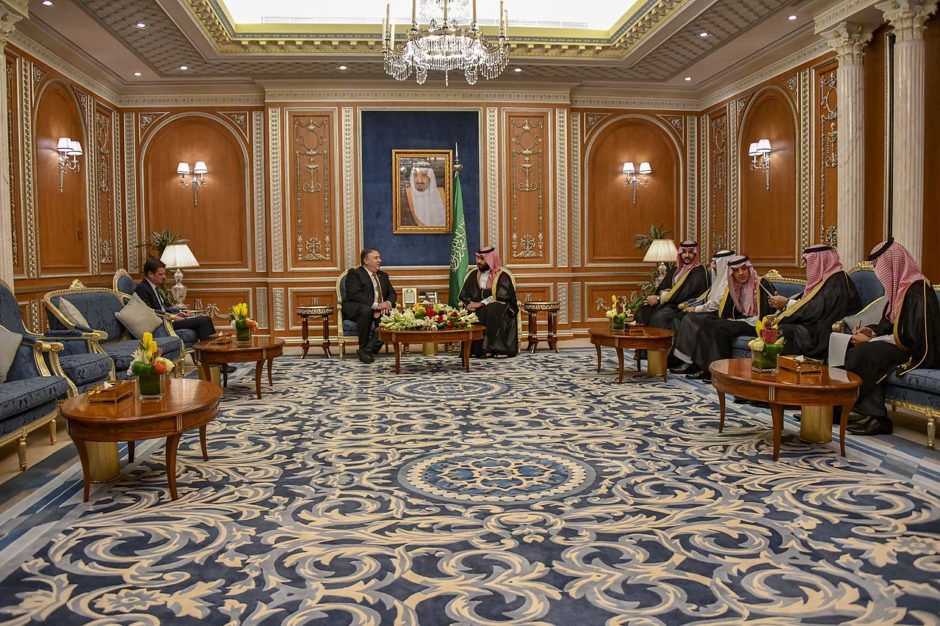If you believe Saudi Arabia’s constantly shifting story about the disappearance of dissident Saudi journalist Jamal Khashoggi, you’ll believe the Brooklyn bridge can be bought.
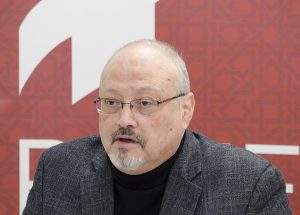
Until very recently, the Saudi narrative was that no harm had come to Khashoggi and that he had left the Saudi consulate in Istanbul in peace.
Judging by the evidence, he was killed by a Saudi hit team on October 2 acting on the orders of senior Saudi officials. Crown Prince Mohammed bin Salman, the 33-year-old son of King Salman and the de facto ruler of Saudi Arabia — a key U.S. ally in the Middle East — was most probably aware of the gory plot. He may have even concocted it.

This would not be surprising in the least.
Several years ago, the impulsive and reckless crown prince intervened in the civil war in Yemen, which has degenerated into a quagmire for Saudi Arabia. Earlier this year, he picked a needless fight with Canada over a tweet by Canadian Foreign Minister Chrystia Freeland regarding the absence of human rights in Saudi Arabia. Last year, he invited Lebanese Prime Minister Saad Hariri to Saudi Arabia and rashly held him hostage until he was finally released due to international pressure.
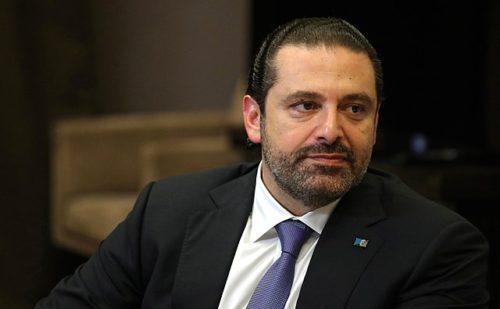
Saudi Arabia’s tissue of lies with respect to Khashoggi were graphically laid bare on October 23, when Turkish President Recep Tayyip Erdogan, Khashoggi’s friend, provided the “naked truth” about his sudden death. Speaking in his usual blunt and blustery style, Erdogan said that Khashoggi — a permanent resident of the United States and a columnist for The Washington Post — had been killed in a “premeditated murder.” As he put it, “It is clear that this savage murder did not happen at the drop of a dime but was a planned affair.”
Erdogan was careful not to accuse Saudi officials by name. Nor did he, as widely expected, release audio and video recordings of the killing that the Turkish government allegedly has in its possession. But he demanded that the Saudi suspects should be extradited to Turkey and put on trial there.
Erdogan’s indignation is rooted, in part, in Turkey’s tense bilateral relations with Saudi Arabia.
The two countries are at odds over the Muslim Brotherhood, Hamas and the 2013 military coup in Egypt that resulted in the ouster of Egyptian President Mohammed Morsi and that brought the current president, Abdul Fattah el-Sisi, to power. Another issue that divides them is Turkey’s close ties with Qatar, which Saudi Arabia has tried to isolate and punish.
Certainly, the Khashoggi case has shed light on the United States’ alliance with Saudi Arabia.
Boasting immense oil reserves, Saudi Arabia is one of the biggest buyers of American weapons and munitions, having reportedly agreed to purchase a whopping $110 billion worth of U.S. military equipment. Tens of thousands of jobs in the United States are dependent on this deal, which Donald Trump finalized during a trip to Saudi Arabia in 2017, his first abroad as president.
Washington also needs Saudi Arabia to contain Iran. Apart from being Saudi Arabia’s bitter rival, Iran is a resurgent regional power that has repeatedly threatened to destroy Israel.
As well, Saudi Arabia is perfectly positioned to ensure that gas prices are kept within relatively reasonable bounds. The Trump administration relies on Saudi Arabia to produce sufficient quantities of oil to compensate for Iranian oil removed from the market by U.S. sanctions.
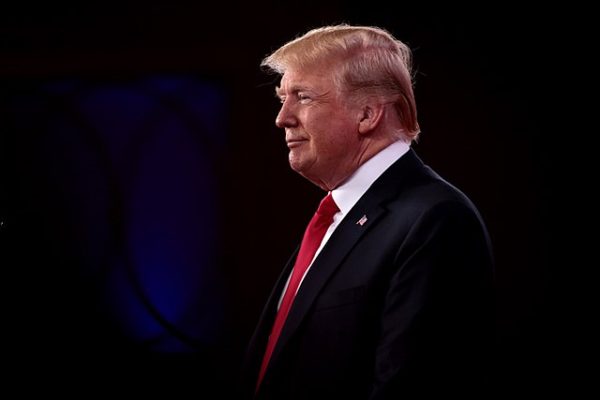
As a result, Trump has gone out of his way to coddle and protect Saudi Arabia, a feudal kingdom whose human rights record is nothing less than abysmal. After Turkey leaked incriminating information about Khashoggi’s murder, Trump wrote on Twitter, “Just spoke to the king of Saudi Arabia, who denies any knowledge of whatever may have happened ‘to our Saudi Arabian citizen,’”
Subsequently, he told reporters, “The denial was very, very strong.” He added, “It sounded to me like maybe these could have been rogue killers. Who knows?” In accordance with his apologist tone, he suggested that the Saudis had not been given an opportunity to prove their innocence.
U.S. Secretary of State Mike Pompeo, having conferred with King Salman and the crown prince in Riyadh, echoed that soft line. He said the Saudi government had promised a “thorough, transparent and timely investigation” into Khashoggi’s fate.
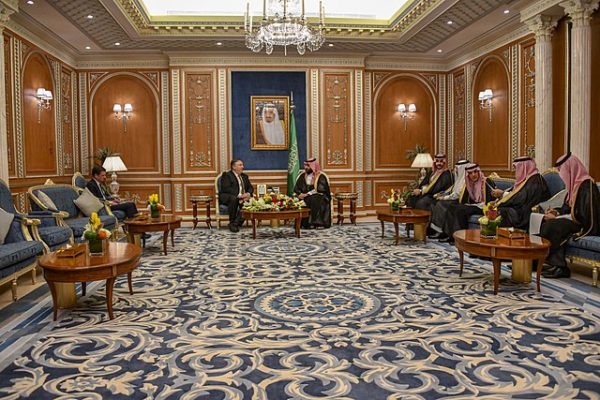
After the Saudis incredulously claimed that Khashoggi had been accidentally killed during a fistfight, Trump was asked whether he found the account credible. “I do,” he replied.
Trump, however, modified his position after U.S. intelligence reports indicated that the Saudi royal court was directly implicated in Khashoggi’s death. “Obviously, there’s been deception and there’s been lies,” he said. “Their stories are all over the place.” Yesterday, Trump was much tougher on the Saudis: “They had a very bad original concept, it was carried out poorly, and the cover-up was one of the worst in the history of cover-ups.”
Trump has vowed to exact “severe punishment” on the Saudis if it can be established that the Saudi government played a direct role in his demise. At the same time, Trump has continued to emphasize that lucrative U.S. arms sales to Saudi Arabia should not be affected by this gory incident.
U.S. Secretary of the Treasury Steve Mnuchin withdrew from a Saudi investment conference in Riyadh, but met with the crown prince to discuss a variety of issues ranging from terrorism financing and sanctions on Iran to the Khashoggi investigation.
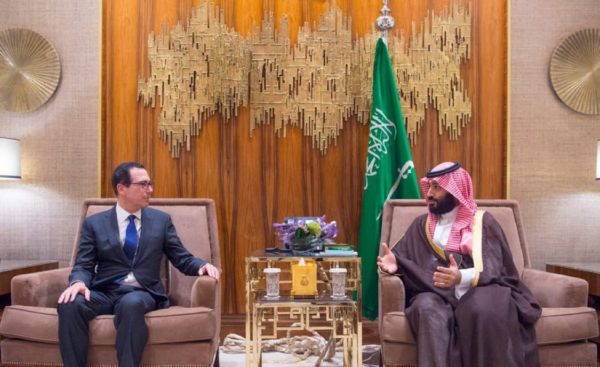
According to unnamed Turkish government officials, Saudi operatives were waiting for Khashoggi, 59, when he walked into Saudi Arabia’s consulate to pick up paperwork he required to marry his Turkish finance, Hatice Cengiz. Tellingly enough, the staff had been given a day off and the security cameras had been turned off when Khashoggi appeared at the consulate.
Turkey claims that the Saudi assassins arrived in two private planes only hours before the operation was due to take place. Some of its members had direct ties to the crown prince. Within minutes of entering the consulate, Khashoggi was beheaded and dismembered with a bone saw. His killers left Istanbul shortly afterwards. His body was handed over to a Saudi operative in Istanbul. The corpse has yet to be found.
On October 19, 17 days after Khashoggi’s murder, the Saudis finally conceded he had been killed inside the consulate. The Saudis said 18 men had been arrested. Included in the tally were the 15 operatives who had been sent to Istanbul to confront Khashoggi. Among them were Said al-Qahtani, a close associate of the crown prince, and General Ahmed al-Assisiri, the deputy director of the Saudi intelligence agency.
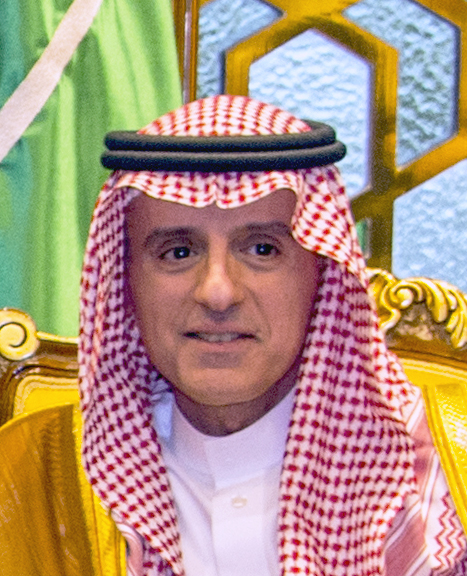
In the first high-level acknowledgment of a cover-up, Saudi Foreign Minister Adel al-Jubeir admitted Saudi culpability, but continued to insist that his death was an accident and that the crown prince was not involved. Western intelligence officials claim he most likely approved the assassination.
Initially, the Saudi media portrayed the Khashoggi affair as a foreign conspiracy to denigrate the kingdom’s image. Al Arabiya, a major television station, for example, claimed that reports about Khashoggi’s death were fabricated by media outlets affiliated with the outlawed Muslim Brotherhood and Qatar, a rival Persian Gulf monarchy whose cordial relations with Iran are a source of concern and anger in Saudi Arabia.
Khashoggi, once a confident of the ruling House of Saud, fell afoul of the powers-that-be in Saudi Arabia after King Salman designated the crown prince as his heir apparent.
Regarding himself as a breath of fresh air in a staunchly conservative nation, the crown prince won a measure of renown by introducing minor reforms. He allowed women to drive, permitted movie theatres to reopen after a three decade-year hiatus and began tweaking the economy. But by the same token, he arrested activists who had called for reform and placed several hundred businessmen whom he had accused of corruption under house arrest in a luxury hotel in Riyadh.
Khashoggi, disillusioned by the crown prince’s tyrannical moves, took aim at him in his first Washington Post column, which appeared on September 18, 2017:
“When I speak of the fear, intimidation, arrests and public shaming of intellectuals and religious leaders who dare to speak their minds, and then I tell you that I’m from Saudi Arabia, are you surprised?” he wrote. “With young Crown Prince Mohammed bin Salman’s rise to power, he promised an embrace of social and economic reform. He spoke of making our country more open and tolerant and promised that he would address the things that hold back our progress, such as the ban on women driving. But all I see now is the recent wave of arrests.
“Last week, about 30 people were reportedly rounded up by authorities, ahead of the crown prince’s ascension to the throne. Some of the arrested are good friends of mine, and the effort represents the public shaming of intellectuals and religious leaders who dare to express opinions contrary to those of my country’s leadership.”
Having unmasked the crown prince as something of fraud, Khashoggi imperilled himself. He died under horrific circumstances, but in the end, the big loser in this fiasco could be the crown prince himself. He has suffered personal reputational damage and tarnished Saudi Arabia’s carefully crafted image as a force for stability. And he has shaken his country’s pivotal relationship with the United States.
In addition, Washington’s efforts to build an alliance against Iran, with Saudi Arabia and Israel at its center, may have been compromised by this foolish and amateurish assassination.
It goes without saying that the Saudi spin control machine will try to rehabilitate the wayward crown prince, but it may be an uphill battle.
